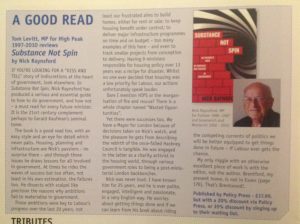Tom reviews ‘Substance not Spin’ for Order, Order, the magazine of former Members of Parliament:
 If you’re looking for a ‘kiss and tell’ story of indiscretions from the heart of government, look elsewhere. In ‘Substance not Spin’ Nick Raynsford has produced a serious and essential guide to how to do government – and how not – a must read for every future minister. It’s the 21st century complement, perhaps, to Gerald Kaufman’s seminal tome.
If you’re looking for a ‘kiss and tell’ story of indiscretions from the heart of government, look elsewhere. In ‘Substance not Spin’ Nick Raynsford has produced a serious and essential guide to how to do government – and how not – a must read for every future minister. It’s the 21st century complement, perhaps, to Gerald Kaufman’s seminal tome.
The book is a good read too, with an easy style and an eye for detail which never palls; housing, planning and infrastructure are Nick’s passions (no surprise there) and through these issues he draws lessons for all involved in government. At times he rides the waves of success but too often, not least in his own estimation, the failures too. He dissects with scalpel-like precision the reasons why ambitions fail to materialise in Government.
Those ambitions were key to Labour’s progress over the last 20 years, not least our frustrated aims to build homes, either for rent or sale; to keep housing benefit under control; to deliver major infrastructure programmes on time and on budget (too many examples of this here) – and even to track smaller projects from conception to delivery. Having nine ministers responsible for housing policy over 13 years was a recipe for disaster; whilst no one ever decided that housing was a low priority for Labour our actions, unfortunately, speak louder.
Dare I mention HIPS or the reorganisation of fire and rescue? There’s a whole chapter named ‘Wasted opportunities’.
Yet there were successes too: we have a Mayor for London because of decisions taken on Nick’s watch, and the pleasure he gets from describing the rebirth of the once-failed Hackney council is tangible. He was engaged in the latter as a charity activist in the housing world, through various government roles to being a post-ministerial London backbencher.
Nick was never loud: I’ve known him 25 years and he is ever polite, engaged, intelligent and passionate – in a very English way. He worries about getting things done and if we can learn from his book about riding the competing currents of politics we will be better equipped to get things done in future – if Labour ever gets the chance.
My only niggle with an otherwise excellent piece of work is with the editor, not the author: Brentford, my present home, is not in Essex (p176) – that’s Brentwood!